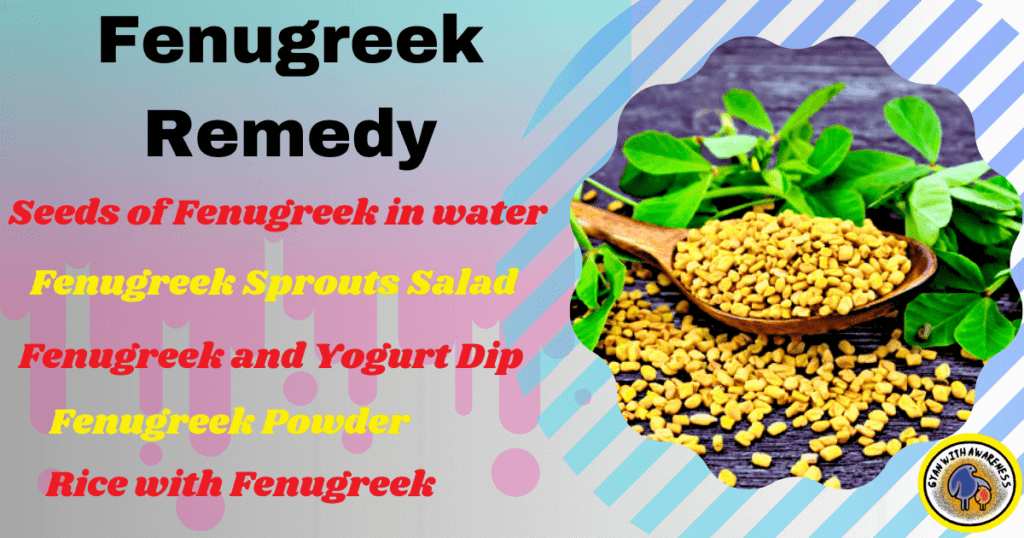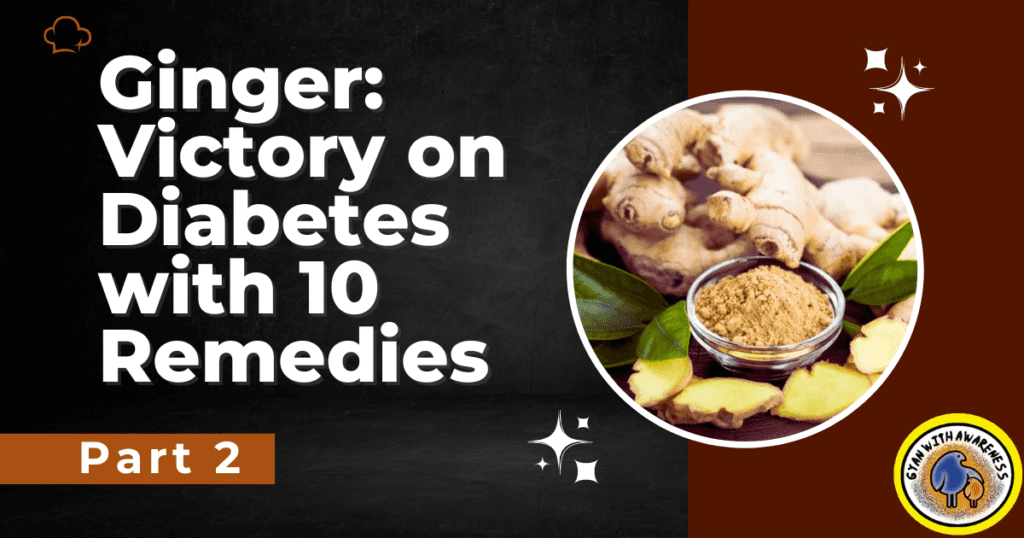Welcome to “Ginger: Victory on Diabetes with 10 Remedies- Part 2”. Ginger, a revered spice known for its distinct flavor and remarkable medicinal properties, has found its way into the spotlight for its potential benefits in managing diabetes. Originating from the rhizome of the Zingiber officinale plant, ginger has been used for centuries in various culinary and traditional medicinal practices across cultures. Beyond its culinary allure, ginger boasts a spectrum of qualities that make it a promising natural remedy for diabetes management.
From its anti-inflammatory and antioxidant attributes to its potential role in regulating blood sugar levels, ginger’s multifaceted nature offers a glimmer of hope for those seeking alternative approaches to diabetes care. In this exploration, we delve into the exceptional qualities that ginger possesses and its potential as a complementary strategy in the intricate landscape of diabetes management.
We will examine a variety of natural treatments and methods in this educational guide that can assist people with diabetes in managing their disease and enhancing their general well-being. Natural remedies can assist and supplement medical therapies and lifestyle changes in the management of diabetes, which are both essential components.
This comprehensive resource will delve into various home remedies that have been traditionally used to aid in blood sugar control, promote insulin sensitivity, and address common symptoms associated with diabetes. From herbs and spices to dietary modifications and lifestyle practices, we will explore a wide array of natural options that may benefit those with diabetes.
Our goal is to arm you with knowledge that is supported by research and useful advice so you can take control of your health. It’s crucial to remember that natural treatments should be utilized in conjunction with prescription treatment programs and medical advice from qualified healthcare providers. Before implementing any new treatments or making any adjustments to your diabetes management practice, always speak with your doctor.
By exploring the power of natural home remedies, you can gain insights into alternative approaches that may enhance your overall well-being and support optimal diabetes management. We encourage you to explore the various remedies discussed in this guide and work with your healthcare team to determine the most suitable options for your unique needs.
Get ready to embark on a journey of discovering natural remedies that can complement your diabetes management and contribute to a healthier, more balanced life. Let’s explore the potential benefits of natural home remedies in managing diabetes effectively and promoting overall wellness.
Boon Natural Home Remedies for Diabetes:
Holistic Approach:
Natural home remedies for diabetes offer a holistic approach to managing the condition by focusing on overall well-being and addressing underlying factors that contribute to diabetes.
Minimizing Side Effects:
Many conventional medications used to treat diabetes can have side effects. Natural home remedies provide alternative options with potentially fewer adverse effects, promoting a more natural and gentle approach to managing the condition.
Blood Sugar Control:
Natural remedies can help regulate blood sugar levels by improving insulin sensitivity, enhancing glucose metabolism, and reducing insulin resistance, thereby supporting better glycemic control.
Nutrient-Rich Options:
Including nutrient-dense foods, herbs, and spices in the diet is a common part of natural treatments. Essential vitamins, minerals, antioxidants, and anti-inflammatory substances are provided by these nutrients, which can support general health and enhance diabetic management.
Personalized Approach:
Natural home remedies can be tailored to an individual’s specific needs and preferences. They offer flexibility in terms of incorporating different remedies, dietary modifications, and lifestyle practices that resonate with each person’s unique circumstances.
Also Read: The Best Medicinal Plants Chart: 10 Medicinal Plants in India
Herbs: The Revolutionary Solution to Beat Diabetes – Part 1
Remedies:
Aloe Vera Remedy Recipe:

Aloe vera juice:
This can be made by scraping the fresh gel from Aloe vera leaf and mixing it with water. A moderate glass of juice each day may help to enhance blood glucose control and promote general health. It is critical to keep in mind that aloe vera could conflict with some medications, so consult a doctor before using it
Aloe Vera Gel Topical Use:
Fresh aloe vera gel can be topically applied to small burns, skin irritations, and wounds, which are frequent problems for diabetics. Aloe vera offers calming and restorative qualities that could promote wound healing.
Aloe Vera Smoothie:
Blend fresh aloe vera gel with other diabetic-friendly ingredients like spinach, cucumber, and lemon to create a nutritious smoothie. This can be consumed as a part of a balanced diet to potentially support blood sugar management.
How Aloe Vera is Beneficial in Diabetes?
Blood Sugar Control:
The aloe vera plant includes substances like glucomannan that may lower blood sugar levels by delaying the bloodstream absorption of sugar.
Insulin Sensitivity:
Some studies suggest that Aloe Vera may enhance insulin sensitivity, allowing cells to better respond to insulin’s actions and facilitating glucose uptake.
Anti-Inflammatory Properties:
Aloe Vera’s anti-inflammatory effects may help reduce inflammation often associated with insulin resistance and contribute to improved metabolic function.
Antioxidant Support:
The antioxidants present in Aloe Vera, such as vitamins C and E, help combat oxidative stress, which can contribute to diabetes-related complications.
Glycemic Control:
Aloe Vera supplementation might aid in maintaining stable blood sugar levels by preventing sudden spikes and crashes in glucose levels.
Improved Lipid Profile:
Some studies suggest that Aloe Vera may contribute to lowering triglycerides and cholesterol levels, reducing the risk of cardiovascular issues often linked with diabetes.
Digestive Aid:
Aloe Vera’s soothing properties may support healthy digestion, helping to optimize nutrient absorption and minimize blood sugar fluctuations.
Wound Healing:
Aloe Vera’s topical application can aid in the healing of diabetes-related skin complications like ulcers, thanks to its regenerative and antimicrobial properties.
Nerve Protection:
Aloe Vera’s potential neuroprotective effects could help prevent nerve damage often seen in diabetes (neuropathy).
Weight Management:
Incorporating Aloe Vera into a balanced diet may indirectly support weight management, a crucial aspect of diabetes care, by promoting healthy digestion and reducing inflammation.
Even while aloe vera shows promise as a supplemental method of managing diabetes, it’s crucial to speak with a medical expert before making any significant adjustments to your regimen.
Ginger Remedy Recipe:

1. Hot Ginger Tea:
Peel and grate a tiny piece of ginger root for your ginger tea. It should be mixed with a cup of hot water, steeped, and then removed. Drink the tea after straining. Because of its anti-inflammatory qualities, ginger may help increase insulin sensitivity and lessen diabetes-related inflammation.
2. Ginger lemonade:
Add the juice of half a lemon to a glass of warm water to make ging lemonade. Grated ginger should be added in one tablespoon. To aid with digestion and glucose regulation, take this mixture first thing in the morning on an empty stomach.
3. Ginger Stir-Fry:
Incorporate fresh ginger root into your stir-fry dishes. Sauté ginger with vegetables, lean protein, and low-sodium sauces for a flavorful and diabetes-friendly meal. Ginger adds a spicy kick and may offer additional health benefits.
4. Ginger-Lemon Honey Shot:
Extract the juice of half a lemon and grate a small piece of ginger. Mix the lemon juice, grated ginger, and a teaspoon of honey. Consume this mixture as a shot to potentially boost digestion and support overall well-being.
5. Ginger-Lime Stir-Fry Sauce:
In a small bowl, combine minced ginger, lime juice, low-sodium soy sauce, and a touch of honey. Use this flavorful sauce to stir-fry your choice of vegetables and lean protein for a nutritious and diabetes-friendly meal
How Ginger is Beneficial in Diabetes?
Blood Sugar Regulation:
Ginger contains active compounds that may enhance insulin sensitivity, leading to better control over blood sugar levels and potentially reducing the risk of diabetes-related complications.
Improved Insulin Function:
Some studies suggest that ginger may support the functioning of insulin-producing cells in the pancreas, aiding in the proper secretion of insulin.
Anti-Inflammatory Effects:
The anti-inflammatory properties of ginger can help mitigate chronic inflammation often associated with insulin resistance, contributing to better metabolic health.
Antioxidant Support:
Ginger’s high content of antioxidants, such as gingerol, can help neutralize harmful free radicals, reducing oxidative stress that can worsen diabetes symptoms.
Cardiovascular Protection:
Ginger’s potential to lower cholesterol levels and improve blood circulation supports overall heart health, a crucial concern for individuals with diabetes.
Weight Management:
Ginger’s thermogenic properties may increase metabolism and promote fat burning, potentially assisting in weight management, a vital aspect of diabetes care.
Reduced Glycemic Index:
Eating ginger with meals may help reduce the meal’s glycemic index, which will result in slower carbohydrate digestion and absorption and, as a result, more stable blood sugar levels.
Improved Digestion:
Ginger facilitates digestion by encouraging the production of digestive enzymes, which might enhance nutrient absorption and lessen the likelihood of blood sugar increases after meals.
Nerve Health:
Ginger’s anti-inflammatory effects may offer protection against nerve damage (neuropathy) often linked with diabetes.
Appetite Regulation:
Ginger’s ability to help control appetite and reduce overeating can contribute to better blood sugar control and weight management.
Before incorporating ginger into your diabetes control plan, as with any complementary strategy, it’s crucial to speak with a healthcare expert, especially if you take medication or have a history of health issues.
Fenugreek Remedy Recipe:

1. Seeds of Fenugreek in water:
A spoonful of Fenugreek seeds should be soaked in a glass of water overnight. On an empty stomach in the morning, sip the water. It is well known that fenugreek seeds can increase glucose tolerance and decrease glucose levels.
2. Fenugreek Powder:
Add fenugreek powder to your dishes, such as curries, stews, or roasted vegetables. Fenugreek has a slightly bitter taste and can enhance the flavor of various recipes. It may also contribute to better blood sugar control.
3. Fenugreek Sprouts Salad:
Sprout fenugreek seeds at home and incorporate them into salads. Combine fenugreek sprouts with other fresh vegetables, herbs, and a light dressing for a nutritious and diabetes-friendly salad option.
4. Fenugreek and Yogurt Dip:
Blend soaked fenugreek seeds with plain yogurt, garlic, lemon juice, and a pinch of salt. Enjoy this dip with raw vegetables or whole-grain crackers as a healthy snack option that may contribute to better blood sugar control.
5. Rice with Fenugreek:
Prepare basmati rice by adding fenugreek seeds, along with other fragrant herbs and spices like cumin and cardamom. A balanced and diabetic-friendly supper can be prepared by pairing this fragrant and savory rice dish with grilled chicken or fish.
How Fenugreek is Beneficial in Diabetes?
Diabetes Control:
The soluble fiber included in fenugreek seeds helps slow down the absorption of sugar, improving blood sugar control and lowering post-meal rises.
Improved Insulin Sensitivity:
Fenugreek may enhance insulin sensitivity, allowing cells to respond more effectively to insulin’s actions and promote better glucose utilization.
Enhanced Insulin Production:
Compounds in fenugreek seeds are believed to stimulate the pancreas to release more insulin, supporting the body’s natural regulation of blood sugar.
Reduced Glycemic Index:
The soluble fiber in fenugreek can lower the glycemic index of meals, resulting in steadier blood sugar levels after eating.
Reduced LDL (“bad”) Cholesterol Levels:
Fenugreek’s soluble fiber also helps to lower LDL cholesterol levels, which lowers the risk of cardiovascular issues, which are frequently linked to diabetes.
Antioxidant Properties:
The antioxidants in fenugreek help combat oxidative stress, reducing cell damage and inflammation linked to diabetes-related complications.
Digestive Health:
Fenugreek can soothe gastrointestinal discomfort, promoting healthy digestion and minimizing the risk of digestive issues that can affect blood sugar levels.
Weight Management:
Fenugreek’s fiber content promotes a feeling of fullness, potentially aiding in weight management, an important aspect of diabetes care.
Anti-Inflammatory Effects:
Fenugreek has anti-inflammatory effects that can reduce inflammation, which is a factor in insulin resistance and other metabolic abnormalities.
Enhancement of Lipid Profiles:
Fenugreek supplementation may improve lipid profiles by lowering triglycerides and raising HDL (“good”) cholesterol levels.
It’s important to note that natural home remedies should be used as complementary approaches alongside conventional medical care and under the guidance of healthcare professionals. They are not meant to replace prescribed medications or professional medical advice. The main goal is to integrate these remedies as part of a comprehensive diabetes management plan to support overall health and well-being.
In conclusion, the incorporation of home remedies such as ginger, aloe vera, and fenugreek holds significant promise in the realm of diabetes management. These natural ingredients bring a range of potential benefits, from blood sugar regulation and improved insulin sensitivity to antioxidant support and inflammation reduction. Each remedy contributes its unique qualities to the holistic approach of maintaining stable glucose levels and overall well-being.
It’s important to remember that while these treatments could have some advantages, they shouldn’t be used in place of proper medical care and guidance. Before making any big changes to their diabetes management approach, one must speak with a healthcare professional to verify that these treatments are adopted safely and successfully.
Furthermore, our exploration of home remedies for diabetes does not end here. In Part 3, we will delve into additional natural solutions that have shown promise in supporting diabetes management. By continuing this journey, we hope to provide a comprehensive understanding of the various approaches individuals can consider to enhance their diabetes care regimen. Stay tuned for more insights on other beneficial remedies in our ongoing exploration.
Read More: Rosemary: Victory on Diabetes with 10 Remedies- Part 1
100% Best Way to Lower Blood Sugar Levels Naturally
Dangerous Complications: Decoding 8 Health Risks Linked to Diabetes
FAQ:
Is ginger good for a diabetic?
Certainly, those who have diabetes can benefit from ginger. Its chemical ingredients have the potential to lower inflammation and enhance insulin sensitivity to help control blood sugar levels. Additionally, the anti-oxidant qualities of ginger might reduce oxidative stress, and its digestive advantages may help with nutritional absorption and blood sugar regulation after meals. Under the supervision of a healthcare expert, including moderate doses of ginger in a diabetes management plan may provide supporting benefits for blood sugar regulation and general well-being, even though it is not a replacement for medical advice or therapies.
Can diabetics drink ginger water?
Yes, drinking ginger water can be part of a diabetic’s diabetes control strategy. Due to the characteristics of ginger that assist blood sugar balance and insulin sensitivity, ginger water, which is produced by infusing fresh ginger slices in water, may provide advantages. Ginger’s active ingredients may help the body respond to insulin more effectively, lower inflammation, and promote better digestion, all of which can help you maintain better blood sugar management.
However, diabetics must speak with a medical practitioner before introducing ginger water into their routine, especially if they are taking medication or have other health issues. When making any dietary modifications, it is critical to monitor blood sugar levels and modify diabetic medicines accordingly.
Can diabetics drink lemon and ginger?
Yes, diabetics can consider drinking a combination of lemon and ginger, as it can potentially offer various health benefits. Lemon and ginger have properties that could contribute to better blood sugar management. Lemon is low in calories and carbohydrates, and its high vitamin C content can aid in immune support. Ginger, on the other hand, has compounds that might help improve insulin sensitivity, regulate blood sugar levels, and reduce inflammation. Combining lemon and ginger in warm water can create a refreshing and potentially healthful drink for individuals with diabetes.
However, diabetics should consult with a healthcare professional before introducing any new elements into their diet, as individual responses can vary based on medication regimens and specific health conditions. Monitoring blood sugar levels closely and seeking medical guidance ensures that any dietary changes align with their overall diabetes management plan.

2 thoughts on “Ginger: Victory on Diabetes with 10 Remedies- Part 2”